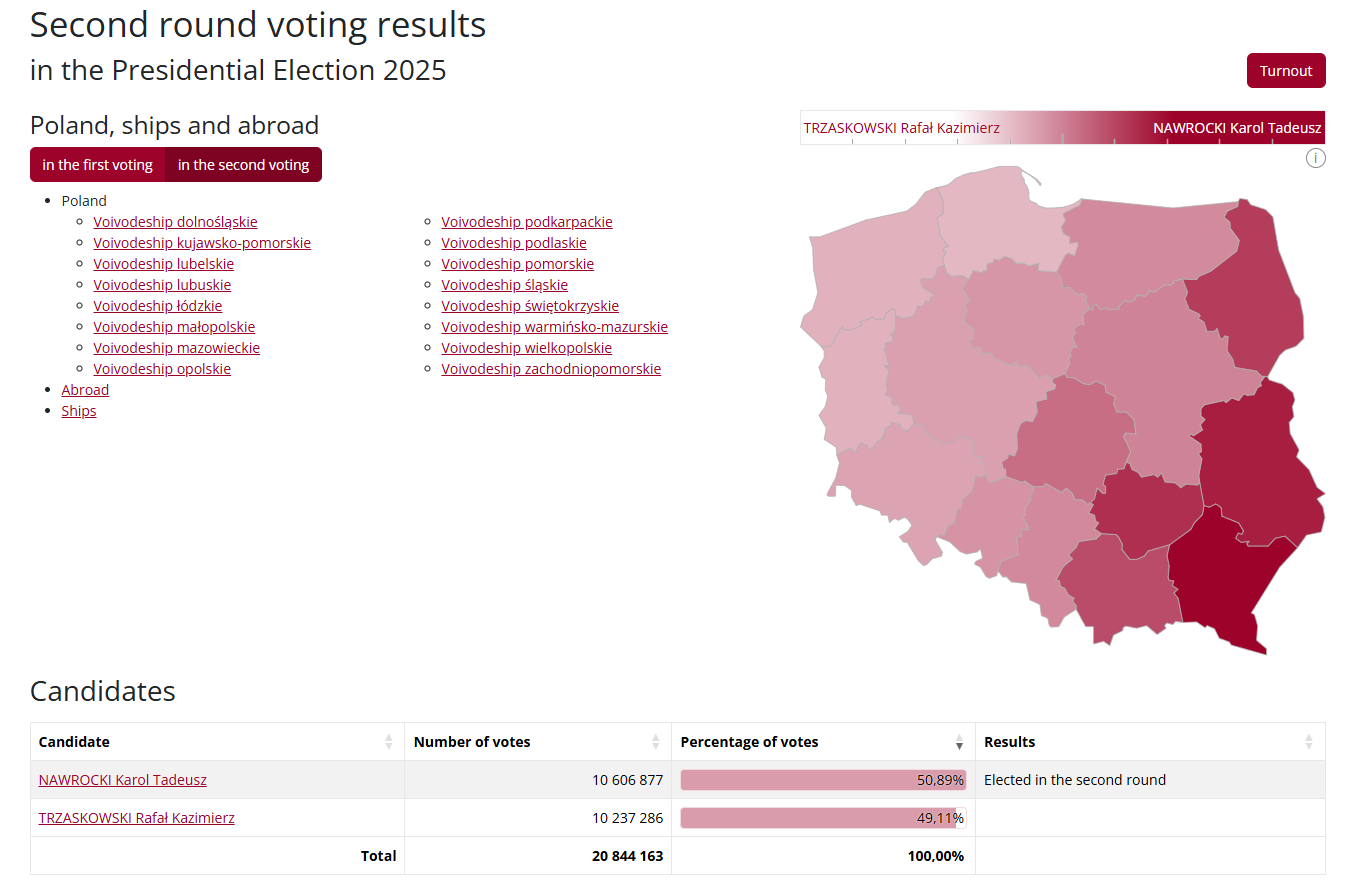Poland held presidential elections in two rounds: the first on 18 May and the second on 1 June 2025. In the latter, Karol Nawrocki prevailed with 50.89% of the vote, defeating Rafał Trzaskowski, the liberal mayor of Warsaw, who obtained 49.11%. Nawrocki will take office on 6 August, succeeding Andrzej Duda.

Source: Poland’s National Electoral Commission
In the Polish political system, the presidency is far from ceremonial. The head of state holds legislative veto power and can propose bills, which grants significant influence in fragmented parliamentary contexts. This tool will be crucial in shaping the future energy agenda.
A challenging outlook for renewables
Krzysztof Jaworski, founder of KJ Strategy, anticipates to Strategic Energy Europe that Nawrocki’s election will structurally alter the political viability of the energy transition in Poland. According to the analyst, this shift will occur on three levels: legislative blockage, discursive reconfiguration, and prioritisation of non-renewable strategic technologies.
“His narrative is centred on energy sovereignty, autonomy from Brussels, and the defence of strategic resources such as coal and nuclear power,” Jaworski analyses.
“This makes many renewable initiatives —especially those linked to meeting European targets— likely targets of his veto power,” he adds.
Although Nawrocki does not control Parliament, his capacity to halt legislative initiatives will be enough to slow down or severely constrain policies aligned with the Green Deal. The institutional context does not favour an ambitious transition.
Who is Karol Nawrocki?

Karol Nawrocki, President of Poland
A historian by profession and former director of the Institute of National Remembrance, Nawrocki represents a nationalist and sovereigntist current within Polish politics. His discourse is structured around three pillars: the defence of coal as a strategic asset, scepticism towards the EU’s climate targets, and support for energy independence based on domestic resources and nuclear power.
He was also an amateur boxer in his youth, a trait that has reinforced his image as a strong and combative man. Some media outlets have dubbed him the “Trump of Poland”, both for his confrontational style and his political affinities. In fact, he received support from the former US president during his campaign.
During the campaign, Nawrocki explicitly rejected what he described as “ideological decarbonisation”, framing the European Green Deal as a threat to national sovereignty. His approach resonates with traditional industrial sectors and a gradualist vision focused on resisting “external pressures” from Brussels.
A volatile political landscape and its implications
Polish energy policy has oscillated between passivity and contradiction. The PiS party, despite its rhetorical scepticism towards the Green Deal, ratified it during its government but failed to implement significant action. In parallel, the PO party —now KO— promised energy reforms in 2023 but largely backtracked on its commitments once in power.
“Neither of the two major blocs has maintained a coherent or sustained energy policy. There are promises, but little actual delivery,” notes Jaworski.
This chronic ambiguity has resulted in a weak legal framework and a climate of regulatory distrust, which Nawrocki could intensify from the presidency by adding another layer of institutional blockage.
Projections for 2026: possible shifts in the political scenario
There are indications that the current government may dissolve in 2026, potentially triggering early parliamentary elections. Several analysts predict that a future coalition between the centre-right and far right could take power, further reinforcing a sovereigntist and sceptical stance towards the Green Deal.
This potential legislative shift would expand Nawrocki’s room for manoeuvre, allowing him to move from blocking reforms to actively pushing for a full redesign of energy policy.
Offshore wind: an exception on the horizon
In this restrictive scenario, offshore wind energy may be the only technology with a realistic chance of advancing. Its strategic value, industrial contribution, and geopolitical importance in the Baltic Sea position it as an acceptable exception even for a conservative government.
“Offshore wind is the only technology with real chances to progress. It offers industrial value, geopolitical positioning in the Baltic Sea, and support from strategic sectors,” explains Jaworski.
An uncertain future for Poland’s energy transition
Karol Nawrocki’s arrival at the presidency marks the start of an era of institutional uncertainty for renewable energy development. With veto power, a sovereignty-based narrative, and potential legislative allies emerging in 2026, his administration could become a serious bottleneck for green policies.
In the meantime, the sector will have to adapt to a context where energy decisions no longer respond solely to climate goals, but to a logic of national identity, strategic defence, and ideological confrontation with Brussels.































